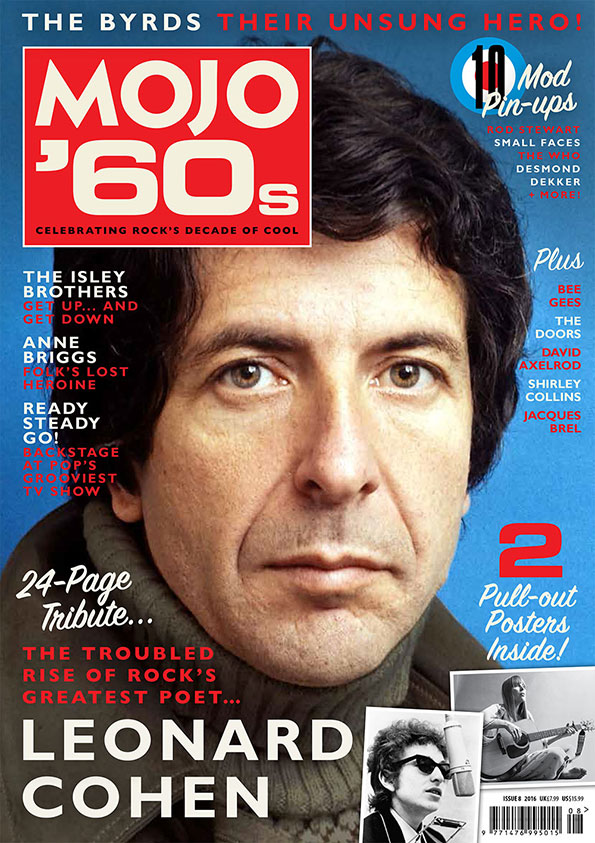David Axelrod: 1933-2017
Two-fisted tales and mind-blowing music meld in the legacy of the psych-jazz-funk conceptualist supreme, who has died, aged 83.

DAVID AXELROD WAS A UNIQUE figure in popular music history, a man whose superhip late-’60s/early-’70s productions and arrangements embraced jazz, soul, funk and psychedelic rock but always reflected a singular and personal vision. In the ’90s he became a name to drop, as his collaborations with the likes of Lou Rawls, Cannonball Adderley, David McCallum and the Electric Prunes provided fodder for crate-digging DJs and turntablists, but his music was even better than the sum of its parts, and sought a freedom that sprang deep from within a singular, combative personality.
“His lush and experimental orchestral soundscapes would prove influential.”
Born in South Central Los Angeles on April 17, 1933, Axelrod’s street-tough attitude stemmed from teenage years spent running around Central Avenue where, following his father’s passing when he was 12 and the death of his older brother, he fell in with a crowd of local hoods, developing a heavy-duty reputation and an early taste for drugs and alcohol.

A turning point came when he fell under the benign influence of jazz keyboard player Gerald Wiggins, from whom the 21-year-old received an entrée into the world of jazz and found himself encouraged in his own nascent musical endeavours. A string of low-paid industry jobs eventually led to him being given a break as a rookie producer, his first credit of note being The Fox, an album he made with hard bop tenor sax player, Harold Land, which he self-financed to the tune of $1,200 and sold to Hi-Fi Records. The album was released in 1959 to critical acclaim.
The Fox became Axelrod’s calling card, its production impressive enough to alert alto sax player Cannonball Adderley, with whom he would form a lasting relationship until the latter’s death in 1975. Highlights of their work together would include Mercy, Mercy, Mercy! Live At ‘The Club’ (1966), Why Am I Treated So Bad! (1967) and The Price You Got To Pay To Be Free (1970).

Now one of the in-house producers at Capitol Records, Axelrod’s first venture outside the jazz world was an unlikely gamble on the celeb status and musical abilities of Scottish actor (and former oboist) David McCallum, the co-star of TV series The Man From U.N.C.L.E. The alliance would lead to a string of gold albums, including Music… A Part Of Me (1966), Music: It’s Happening Now! and Music… A Bit More Of Me (1967).
The latter album typified Axelrod’s innovative approach to sound, composition and arranging, and included The Edge, a track that would be widely sampled, most notably by Dr Dre on the track, The Next Episode, released in 2000. The success of McCallum’s albums provided the man known as ‘The Axe’ with financial security and allowed him to enjoy further the spoils associated with the music industry of that time. With friends who now included Frank Zappa and Sly Stone, he was now operating at the epicentre of LA’s rapidly evolving studio culture.
Working with soul singer Lou Rawls on a string of rich-sounding albums, Axelrod hired the cream of LA’s session musicians, including members of the celebrated Wrecking Crew. He would employ them on Mass In F Minor and Release Of An Oath, two hugely ambitious albums released by psychedelic outfit The Electric Prunes in 1968. Their lush and experimental orchestral soundscapes would prove influential some 30 years later, and the track Holy Are You (from Release Of An Oath) was sampled by Fat Joe in 1995.
Axelrod’s own musical vision intensified on a string of solo records which he began to create in parallel with his work with other artists. Song Of Innocence (1968) and Songs Of Experience (1969) – both of which drew on his love of William Blake’s poetry – cut across genres ranging from jazz to baroque pop, neo-classical, and heavy psychedelia. Earth Rot, Rock Messiah and The Auction followed between 1970 and 1972, expanding the heavy, otherworldly liturgical sound which was uniquely his.

In an industry built on shifting sands, Axelrod continued to write into the ‘80s but found his work underappreciated. When his wife was hospitalised following a car crash in 1986, Axelrod found himself assuming the role of carer before almost finding himself homeless a couple of years later. His fall was eased as his work began to inspire a new generation of musicians, especially the beats-compilers of hip-hop.
His influence was openly acknowledged by DJ Shadow and the entire Mo’ Wax family, leading to a resurgence in interest and a new album, Requiem: Holocaust, in 1993. Mo’ Wax would also release an eponymous compilation in 2001 which introduced Axelrod’s music to a new audience, as did Blue Note’s 2005 collection, The Edge.
The royalties that followed from what seemed to become an endless stream of samples accompanied his musical rehabilitation. He performed in London at the Royal Festival Hall in March 2004 where Richard Ashcroft joined him to perform Holy Are You.

The straight-talking Axelrod did little to hide his ill-health at the time, as artists continued to rediscover and draw on the records he’d made throughout the ‘60s and ‘70s. His death on February 5, 2017, was met with tributes from a vast array of fellow musicians including DJ Shadow, Questlove and Cypress Hill. MOJO would like to add its own heartfelt thanks to a man who helped us hear the world in a different way.
You can read the definitive in-depth piece by Andrew Male on David Axelrod’s two-fisted life and mind-blowing music in the current issue of MOJO ’60s which is on sale now and available here…
PHOTO: Alamy

